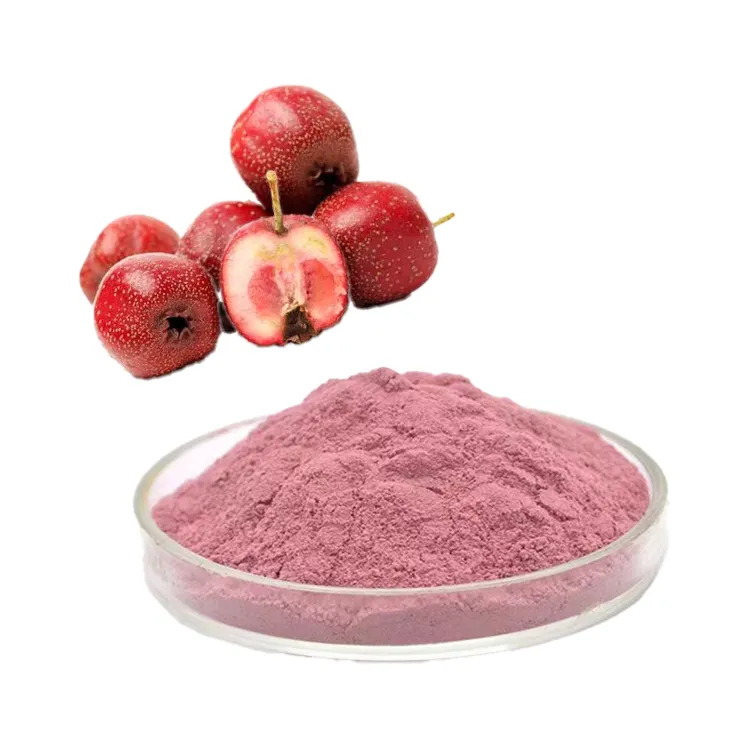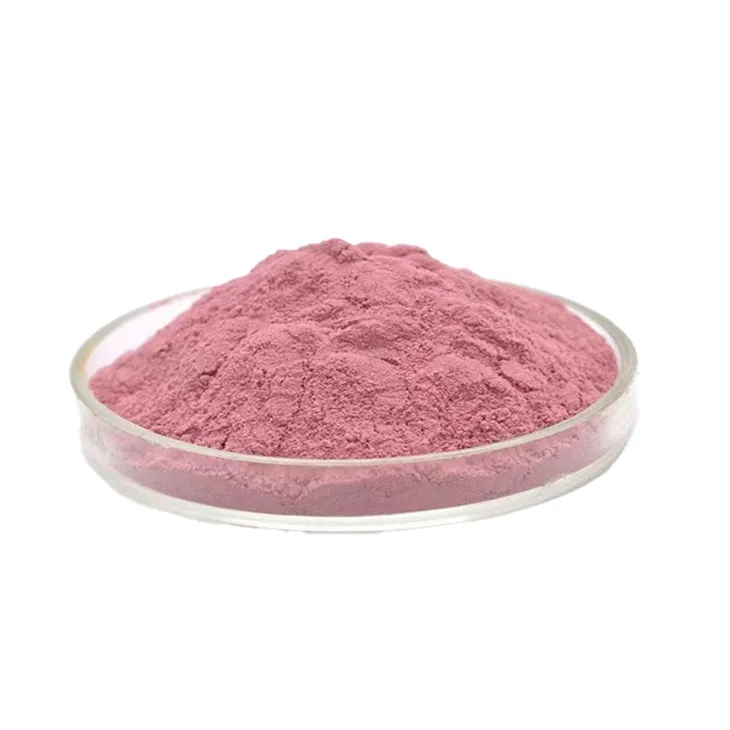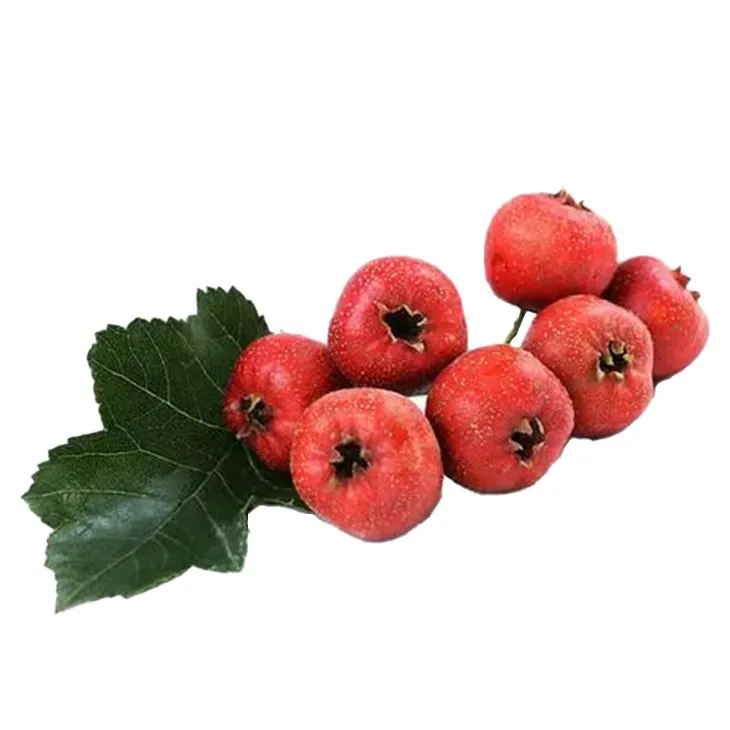- 0086-571-85302990
- sales@greenskybio.com
A Guide to Understanding the Powder Proportion of Hawthorn Powder.
2024-12-20

1. Introduction
Hawthorn powder has been increasingly recognized for its various benefits in different fields, especially in health and food. However, to fully utilize its potential, understanding the powder proportion is of utmost importance. The proportion of Hawthorn powder not only affects its effectiveness in different applications but also plays a crucial role in ensuring safety and optimal results. This guide aims to provide a comprehensive understanding of the factors influencing the proportion of Hawthorn powder and practical tips for accurately determining the right amount for both medicinal and culinary uses.

2. Importance of Understanding Hawthorn Powder Proportion
2.1 In Health Applications
Hawthorn has long been used in traditional medicine for its heart - healthy properties. When it comes to using hawthorn powder for health purposes, the proportion is critical. For example, if the proportion is too high, it may lead to potential side effects such as digestive discomfort or interference with certain medications. On the other hand, if the proportion is too low, it may not provide the desired therapeutic effects. Accurate proportion determination is essential for ensuring that hawthorn powder can effectively contribute to improving cardiovascular health, such as reducing blood pressure, improving blood circulation, and regulating heart rhythm.
2.2 In Culinary Applications
In the culinary world, hawthorn powder is used to add a unique flavor and nutritional value to various dishes and beverages. The proportion of hawthorn powder in recipes can significantly impact the taste and texture of the final product. Too much hawthorn powder may result in an overly tart or bitter taste, while too little may not impart the characteristic flavor that makes hawthorn - based recipes special. For instance, in making hawthorn - flavored jams or drinks, getting the right proportion of hawthorn powder is key to achieving a balanced and delicious flavor profile.

3. Factors Affecting the Proportion of Hawthorn Powder
3.1 The Purpose of Use
As mentioned earlier, whether it is for health or culinary use, the purpose significantly determines the proportion of hawthorn powder. For medicinal use, the proportion may be adjusted based on the specific health condition being treated. For example, for mild heart - related issues, a relatively lower proportion may be sufficient, while for more severe cases, a higher but carefully calibrated proportion may be required. In cooking, the type of dish or drink also dictates the proportion. A hawthorn - infused dessert may require a different proportion compared to a hawthorn - flavored sauce.
3.2 The Quality of Hawthorn Powder
The quality of hawthorn powder itself can influence the proportion used. High - quality hawthorn powder, which is pure and free from contaminants, may be more potent. Consequently, a smaller proportion may be needed to achieve the same effect compared to lower - quality powder. When assessing the quality of hawthorn powder, factors such as the source of the hawthorn, the manufacturing process, and the presence of additives need to be considered. For example, if the hawthorn powder is made from organically - grown hawthorn and processed with minimal additives, it is likely to be of higher quality.
3.3 Individual Tolerance and Sensitivity
People have different levels of tolerance and sensitivity to hawthorn powder. Some individuals may be more sensitive to the active compounds in hawthorn, such as flavonoids. In such cases, a lower proportion of hawthorn powder should be used to avoid adverse reactions. On the other hand, those with a higher tolerance may be able to handle a slightly higher proportion. For example, individuals with a history of digestive problems may need to start with a very low proportion of hawthorn powder when using it for health purposes to ensure that it does not exacerbate their digestive issues.

4. Practical Tips for Determining the Right Proportion
4.1 Research and Consultation
Before using hawthorn powder, it is advisable to conduct thorough research. There are many reliable sources of information, such as scientific studies, traditional medicine references, and health - related websites. Additionally, consulting a healthcare professional or an expert in traditional medicine can provide valuable insights. For example, a doctor or a herbalist can offer advice based on an individual's health history and current condition, which is crucial for determining the appropriate proportion of hawthorn powder for medicinal use.
4.2 Starting with a Low Proportion
A good rule of thumb, especially for those new to using hawthorn powder, is to start with a low proportion. This allows the body to gradually adjust to the effects of the hawthorn powder. In the case of health applications, starting with a small amount and gradually increasing it while observing any reactions can help find the optimal proportion. In cooking, starting with a conservative amount of hawthorn powder and adjusting according to taste can prevent the dish from being overpowered by the hawthorn flavor.
4.3 Measuring Tools and Techniques
Using accurate measuring tools is essential for determining the right proportion of hawthorn powder. For small - scale use at home, a digital scale can be very helpful in precisely measuring the amount of hawthorn powder. In a kitchen setting, measuring spoons can also be used, but it is important to note that the density of hawthorn powder may vary, so careful measurement is still required. For larger - scale production in the food or health product industry, more sophisticated measuring equipment may be necessary to ensure consistent and accurate proportions.

5. Examples of Proportions in Different Applications
5.1 Medicinal Applications
In the treatment of mild hypertension, a common proportion of hawthorn powder may be around 1 - 2 grams per day. This amount can be adjusted based on the patient's response and the presence of other medications. For improving blood circulation in general, a proportion of about 0.5 - 1.5 grams per day may be considered. However, these are just general guidelines, and individual adjustment is always necessary.
5.2 Culinary Applications
When making hawthorn - flavored tea, a proportion of about 1 - 2 teaspoons of hawthorn powder per cup of water can create a pleasant - tasting beverage. For hawthorn - based jams, a proportion of about 10 - 15% of hawthorn powder in relation to the total weight of the fruit used can result in a well - balanced flavor. In baking, using about 5 - 10 grams of hawthorn powder per 500 grams of flour can add a unique flavor to cakes or muffins.
6. Conclusion
Understanding the proportion of hawthorn powder is a complex but essential aspect of making the most of this versatile ingredient. Whether for health or culinary purposes, considering factors such as the purpose of use, the quality of the powder, and individual tolerance is crucial for determining the right proportion. By following practical tips such as research, starting with a low proportion, and using accurate measuring tools, users can ensure optimal results and avoid potential risks. With the knowledge gained from this guide, individuals can confidently incorporate hawthorn powder into their daily lives, reaping its many benefits while maintaining safety and enjoyment.
FAQ:
What are the main factors influencing the powder proportion of hawthorn powder?
The main factors include its intended application. For example, in the health field, if it is used for digestive aid, the proportion might be different compared to when it is used for blood - pressure regulation. In the food industry, whether it is used as a main flavor ingredient or just a minor additive also affects the proportion. Additionally, the quality and characteristics of the raw hawthorn, such as its ripeness and variety, can play a role in determining the powder proportion.
How can one accurately measure the powder proportion of hawthorn powder for medicinal use?
For medicinal use, it is often necessary to follow the guidance of medical professionals or traditional medicine recipes. One can use precise measuring tools like a digital scale. Start with understanding the recommended dosage per unit of body weight or per treatment cycle. For example, if a certain treatment recommends 5 grams of hawthorn powder per day for an adult, measure it accurately using a scale. Also, consider the form in which the hawthorn powder is to be consumed, such as in capsules or mixed with water, as this may affect the accuracy of the proportion.
What is the typical powder proportion of hawthorn powder in food?
In food, the proportion of hawthorn powder can vary widely. In a hawthorn - flavored jam, the proportion might be relatively high, perhaps around 10% - 20% of the total ingredients by weight, to give a distinct hawthorn flavor. In a bakery product like a hawthorn - flavored muffin, it could be much lower, around 1% - 5% to add a subtle flavor. In beverages, it may range from 2% - 8% depending on the desired intensity of the hawthorn taste.
Are there any safety concerns related to incorrect powder proportion of hawthorn powder?
Yes, there are safety concerns. If the proportion is too high in medicinal use, it may lead to adverse effects such as excessive stomach acid secretion or interference with other medications. In the food industry, an incorrect proportion can lead to an unbalanced flavor profile, which may not be acceptable to consumers. Moreover, if the proportion is too high in products that are mass - produced and consumed regularly, it could potentially cause issues related to nutrient imbalance or over - consumption of certain substances in hawthorn.
How does the powder proportion of hawthorn powder affect its health benefits?
The right powder proportion is crucial for maximizing its health benefits. For example, if the proportion is too low, it may not provide sufficient active compounds to have a noticeable effect on digestion or blood - lipid regulation. On the other hand, if it is too high, it may cause an over - stimulation of certain physiological processes. A proper proportion ensures that the body can effectively absorb and utilize the beneficial components in hawthorn powder, such as flavonoids and organic acids, for promoting heart health, improving digestion, and enhancing antioxidant capacity.
Related literature
- The Role of Hawthorn in Traditional and Modern Medicine"
- "Hawthorn: From Orchard to Health - Beneficial Compounds and Their Applications"
- "Optimal Dosage and Proportion of Hawthorn - Based Products in the Food and Pharmaceutical Industries"
- ▶ Hesperidin
- ▶ Citrus Bioflavonoids
- ▶ Plant Extract
- ▶ lycopene
- ▶ Diosmin
- ▶ Grape seed extract
- ▶ Sea buckthorn Juice Powder
- ▶ Fruit Juice Powder
- ▶ Hops Extract
- ▶ Artichoke Extract
- ▶ Mushroom extract
- ▶ Astaxanthin
- ▶ Green Tea Extract
- ▶ Curcumin
- ▶ Horse Chestnut Extract
- ▶ Other Product
- ▶ Boswellia Serrata Extract
- ▶ Resveratrol
- ▶ Marigold Extract
- ▶ Grape Leaf Extract
- ▶ New Product
- ▶ Aminolevulinic acid
- ▶ Cranberry Extract
- ▶ Red Yeast Rice
- ▶ Red Wine Extract
-
Citrus Aurantium Extract
2024-12-20
-
Uridine-5'-monophosphate Disodium salt
2024-12-20
-
Feverfew Extract
2024-12-20
-
Bitter Melon Extract
2024-12-20
-
Milk Thistle Extract
2024-12-20
-
American Ginseng Root Extract
2024-12-20
-
Kupilu Extract
2024-12-20
-
Aminolevulinic acid
2024-12-20
-
Eyebright Extract
2024-12-20
-
Ginseng Root Extract
2024-12-20





















